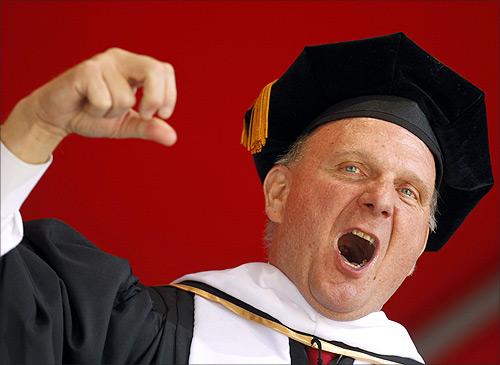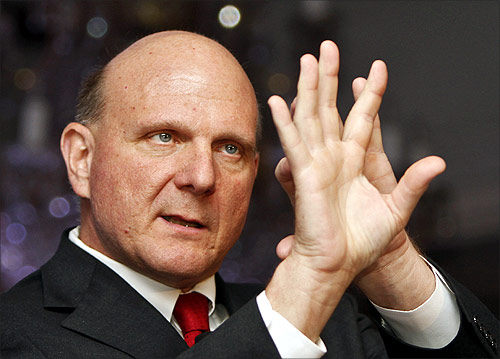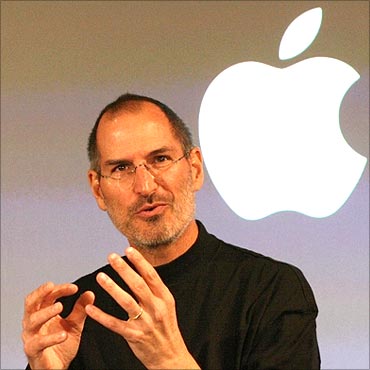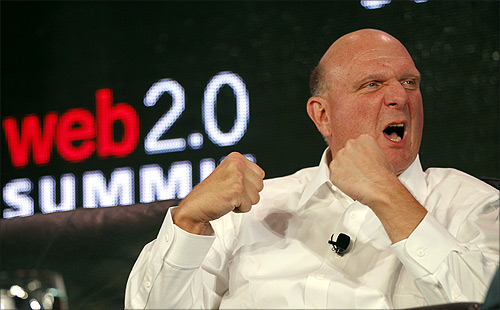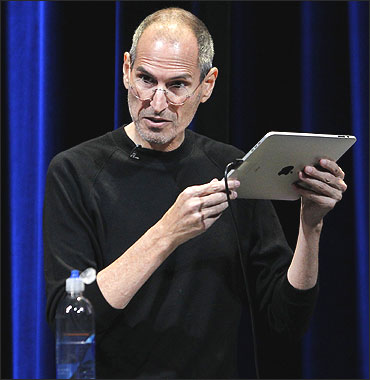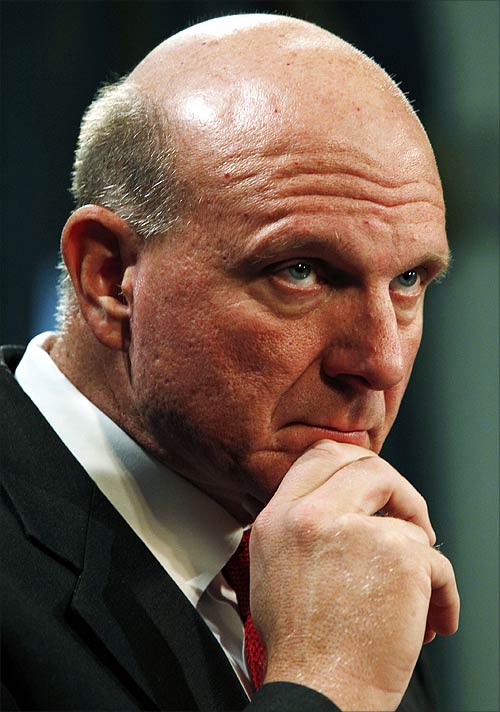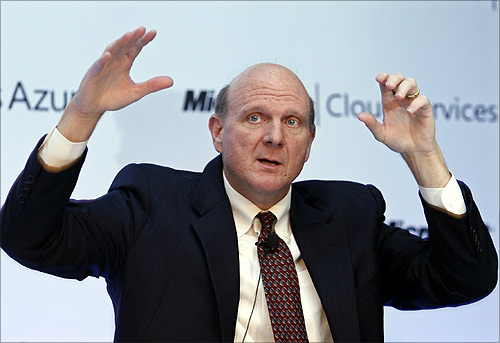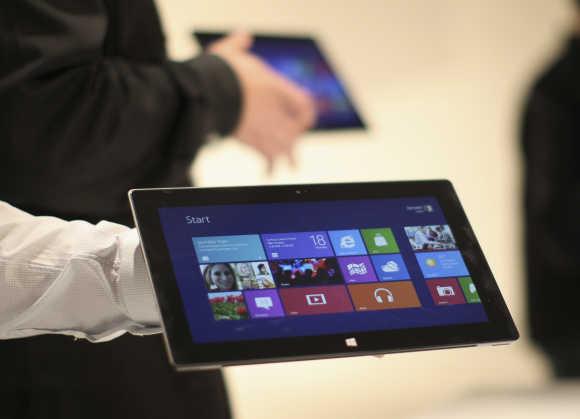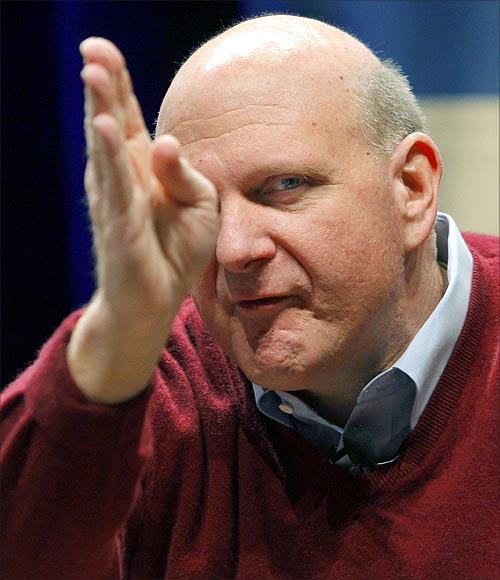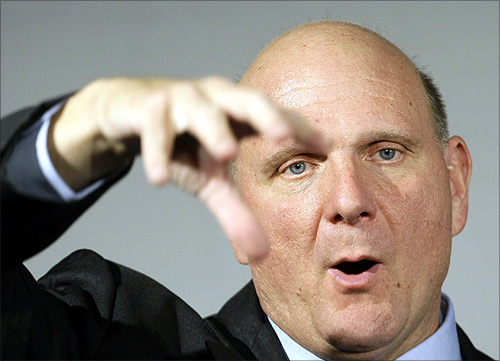 | « Back to article | Print this article |
Microsoft's downfall: Steve Ballmer to be blamed?
"Can you imagine Steve Jobs launching a new ANYTHING that copies everything that someone else does, without any new innovation or problem to solve?"
This was a comment on a blog in reaction to the launch of Microsoft's new tablet, 'Surface,' featuring a cover-cum-keyboard and a kickstand. The 'Surface' is Steve Ballmer's answer to the iPad produced by arch nemesis, Apple Inc.
When Ballmer - who dropped out of Stanford Business School to join Microsoft in 1980 as one of its key members and went on to head sales and operations before becoming President - placed Bill Gates as CEO in 2000, he spoke at length on the challenges his firm would face in the future.
Click NEXT to read more...
Microsoft's downfall: Steve Ballmer to be blamed?
They were: Sun Microsystems, Oracle, IBM and Linux. Even Time Warner elicited a mention.
Today, Ballmer, 55, is playing a furious game of catch-up with none of the companies on that list - firms that, in just a decade, have redefined the way we access, share and consume information and entertainment.
By most measures, Ballmer, who is worth $15 billion, thanks to his stake in Microsoft, has done a more-than- decent job of steering the company through this decade.
Click NEXT to read more...
Microsoft's downfall: Steve Ballmer to be blamed?
Under his watch, Microsoft has almost tripled its revenue (to around $70 billion) and more than tripled profit (to $23 billion).
Yet, the companies not on his list are the ones that have set the agenda in the last decade.
One of those is the 'anti- Microsoft' Apple. Under Steve jobs, Apple re-invented not just computers and phones, but introduced entirely new eco-systems and business models for content dissemination and consumption.
Click NEXT to read more...
Microsoft's downfall: Steve Ballmer to be blamed?
Microsoft, meanwhile, launched operating system Vista to disastrous reviews but continued milking its cash cows, Office and Windows, which make up the majority of its sales and profits.
The year that Ballmer was making his speech, Microsoft's market capitalisation was around $500 billion, while Apple briefly touched $16 billion.
Today, Apple is over half a trillion dollars, while Microsoft wallows at around $257 billion - just $72 billion more than newbie Google, another company not on Ballmer's list.
Click NEXT to read more...
Microsoft's downfall: Steve Ballmer to be blamed?
What's more, Apple has slapped on a staggering $300 billion in market cap in the last two years alone.
Is all of this Ballmer's fault? Maybe. He would be dead in the water without Windows and Office, which he inherited.
However, he has been the driving force behind the wildly successful X-box which is the cornerstone of the company's $9-billion entertainment division as well as Microsoft's data-centre software business that racked up sales of $17.1 billion last year.
Click NEXT to read more...
Microsoft's downfall: Steve Ballmer to be blamed?
Ballmer is no lightweight. In fact, in most photos, he looks like a semi-crazed, heavyweight boxer who could give Tyson a run for his money.
He is known as the 'Embalmer' for his hard-driving habits and is famous for his "fist-pounding, bellowing, bombastic style," according to one news article which also talks about how, in an interview, Ballmer "gesticulated so wildly that he struck his forehead with his fingernail hard enough to draw blood," but, unfazed, continued his interview while dabbing at his wound.
Click NEXT to read more...
Microsoft's downfall: Steve Ballmer to be blamed?
Of course, people say Ballmer is a consummate salesman, and this is all just part of his act.
As an undergraduate at Harvard, he was an applied math 'geek', and as a freshman, lived down the hall from his buddy, sophomore Bill Gates. Apparently, he loves recounting stories of how he edged out Gates at many math and economic tests.
Today, Ballmer realises he doesn't have much time left. After all, the company spent $9 billion on research and development last year and needs to prove to its investors that it's been worth it.
Click NEXT to read more...
Microsoft's downfall: Steve Ballmer to be blamed?
Other than Surface, Ballmer is betting big on Cloud offerings - Microsoft has transplanted Office to the Cloud and has thousands of customers on its business software service called Azure, although critics say that Cloud's business model undermines Microsoft's practice of selling multi-year software licences.
Microsoft's Xbox live service is a bonafide success - attracting around 40 million subscriptions at $60-a-pop annually, delivering games and television shows. It has also created the Zune service for music and movies which runs across Xboxes, PCs, and phones.
Click NEXT to read more...
Microsoft's downfall: Steve Ballmer to be blamed?
His $8.5-billion purchase of Skype - and its integration into Office email and its flagging smartphone platform - could be a powerful way to up the ante on his competitors.
But Ballmer still has some immense challenges ahead of him.
One, his company has, by and large, always missed the bus on the next big thing, whether it comes to inventing a browser to surf the internet (Marc Andressen did that with Navigator but was ultimately stomped by Microsoft's Explorer, piggybacking on Windows) or Search (Bing hasn't exactly set the world on fire, Google has).
Click NEXT to read more...
Microsoft's downfall: Steve Ballmer to be blamed?
For Ballmer and the company to succeed, they have to internalise something that has become key in the technology universe: Thanks to Steve Jobs, most of the world has become used to intuitive user experiences, something that Microsoft has never been good at.
In Walter Isaacson's biography of Steve Jobs, the Apple founder delivers his ultimate verdict on both Microsoft and its current CEO. "They've become mostly irrelevant," Jobs said of Microsoft. "I don't think anything will change at Microsoft as long as Ballmer is running it," he added a few sentences later.
It's up to Ballmer to prove Jobs wrong, and it will take a lot more than Surface to do it.
